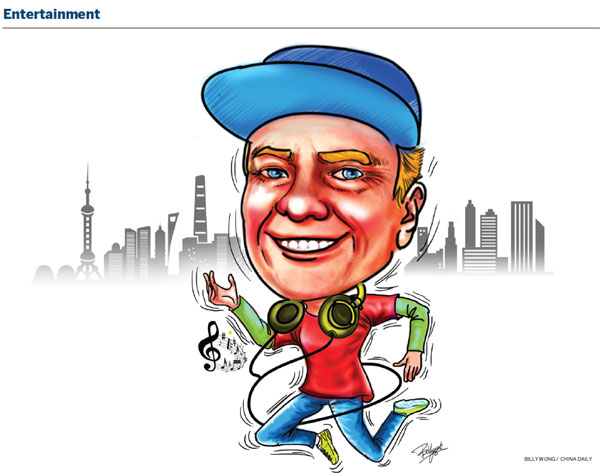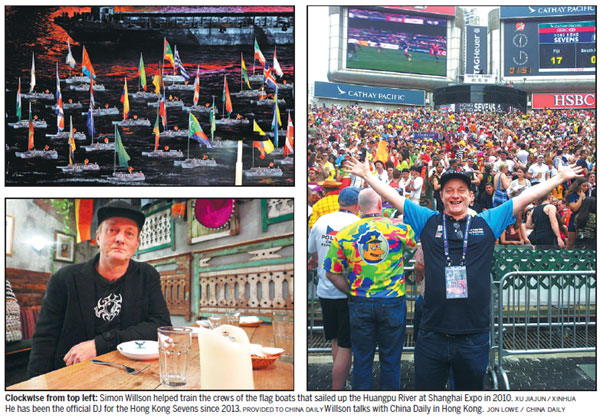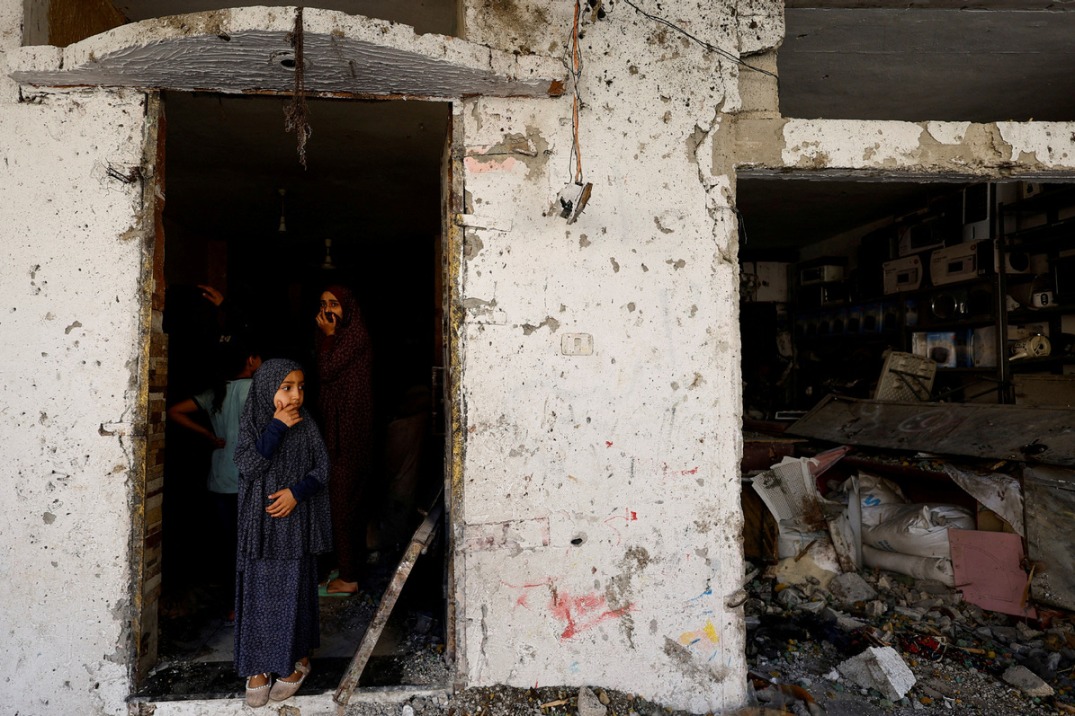Shaking it in Shanghai

 Hong Kong DJ Simon Willson has had a front-row seat to changes on the Chinese mainland in the four decades since the launch of opening-up, as Jon Lowe reports.
Hong Kong DJ Simon Willson has had a front-row seat to changes on the Chinese mainland in the four decades since the launch of opening-up, as Jon Lowe reports.
The annual Hong Kong Sevens rugby tournament is renowned for its party atmosphere, and last weekend's edition was no exception.
The man keeping the music flowing, Simon Willson, has made a name for himself as a radio and live DJ in the southern Chinese city. But what is less well known is that he has also worked on diverse projects, musical and otherwise, on the Chinese mainland at key moments in the four decades since it embarked on opening-up.
While pop music can be an ephemeral thing - short blasts of fun, heartache or joy, over and forgotten in moments - it also has a tendency to indelibly mark the popular perception of history.
In China's case, the economic and cultural opening-up after 1978 had a strong Western pop component. French instrumental artist Jean Michel Jarre wowed the country with his Concerts in China in the autumn of 1981.
The baton was then taken up by Wham!, a racier English duo, who performed in Beijing and Guangzhou in April 1985, whetting the appetite of China's younger generations for the musical onslaught to come.
A year later, Willson entered the scene, becoming the first foreign DJ to take up a residency on the Chinese mainland.
"I have been lucky really; I've found myself at key moments in China," Willson said.
That residency, beginning in Shanghai in the spring of 1986, was at the disco of the brand-new, 5-star Sheraton Hua Ting Hotel in the heart of the city center - back when it was Shanghai's tallest building at 26 stories.
It was among the first wave of joint-venture hotels in China, embodying the post-Mao leadership's strategy of using private foreign capital to spur economic development.
It was opened in 1985, just a few months after ITT Sheraton had become the first Western company to operate a hotel in China when it took over the State-built Great Wall Hotel in Beijing, which became the Great Wall Sheraton.
The first Sino-foreign hotel, opened in 1982, was the Jianguo Hotel in Beijing, which brought in management from Hong Kong's Peninsula Hotels group.
Cycling in Shanghai
Willson said the disco of the Sheraton Hua Ting Hotel "was packed every single night of the week".
"They were coming because it was new, and I guess it was exciting," he said. "At the time you don't really think that you're actually making history."
For a Hong Kong-born Western DJ, then aged 21, it was a musical eye-opener.
"We were playing the pop songs of the day, but also some old rock 'n' roll songs, a bit of cha-cha, a bit of waltz - in fact the most popular song back then was by (1980s synthpop group) Orchestral Manoeuvres in the Dark, of all things, which was a three-step," Willson said. "It was the dancing that they were familiar with that would bring them out on to the dance floor - real floor fillers."
Willson found the denizens of the Sheraton's nightclub both uninhibited and refreshing.
"Often at clubs in the West there's lots of toe-tappers that are more concerned with looking cool than actually enjoying themselves, but that wasn't the case there," he said. "They were really into enjoying themselves and dancing. It was a great gig."
During an eight-month stint that lasted until January 1987, Willson got to explore the city as it was then - on two wheels, naturally.
"Riding bicycles around Shanghai was an absolute pleasure then," he said. "It had a huge park in the center of the city, just off the Bund."
He then traveled from Shanghai to Guangzhou by train - a 36-hour ride in the hard-seat section that gave him another view of life on the Chinese mainland.
"About 18 hours into the trip we stopped at a station in the middle of nowhere," he said. "A large and strong-looking peasant girl got on the train, saw me, came over and struck up a conversation in good English, with questionable pronunciation.
"She asked if I could help her with a book she was reading. Then she took out As You Like It by Shakespeare - totally surreal. We spoke for hours. Never judge a book by its cover!"
Beer and boating
When Willson returned some 11 years later, he said "the old Shanghai had completely disappeared", the park replaced by modern hotels and office towers.
"To a certain degree it was already recognizable as modern Shanghai - though the Pudong area hadn't yet been developed," he said.
His return was for "another groundbreaking gig" - a tour of 38 mainland cities that also included Taiyuan, Beijing and Chengdu, to promote the beer brand Heineken.
Willson managed the tour, which featured the band Kix Interactive, four dancers and a DJ.
"We traveled round China entertaining - with Heineken bunting everywhere," he said. "That tour made it the best-selling imported beer in China at that time. The bars didn't have to pay one red cent, so needless to say they were absolutely ecstatic that they got a level of entertainment that they'd never seen before, brought right into their bar at no cost."
Chinese now drink one-fourth of the world's beer, with the market having really taken off in the 1990s, when it expanded tenfold. That prompted Western companies to stream in, building breweries and spraying the country with marketing campaigns. Their number grew from four in 1994 to 60 in 1999.
Though beneficial to bars and entertainment centers, the foreign brewers did not have much of an impact on the overall market. They still had less than a 1.1 percent share of the mainland beer market in 2016, though it has been rising of late with the growth of the premium beer and craft beer markets.
The next mainland project Willson was involved in was the celebrated Shanghai Expo in 2010.
"I was part of the training team for the flag boats that went up the Huangpu River," he said. "We were the 'wet team' - 'cold and wet' we called ourselves - because the temperatures were quite chilly working on the water, first out at Dishui Lake and then later on the Huangpu River, training students from the Shanghai Maritime University how to drive rigged boats and operate the catamarans.
"If you watch the footage from the expo opening ceremony, we're the ones responsible for the boats that go up the Huangpu River with the flags of the participating countries all raised up."
Expo 2010 Shanghai China was held from May 1 to Oct 31, with the theme "Better City, Better Life", signifying Shanghai's new status as the next great world city.
The opening ceremony was held on both banks of the Huangpu River on the evening of April 30, attended by dozens of world leaders and celebrities, including classical crooner Andrea Bocelli. It featured spectacular light shows, with the largest searchlight, multicolored laser and dancing water fountain displays ever. The rousing flag boat parade on the river was a major highlight.
East meets Westlife
The last time Willson worked in the mainland was as assistant tour manager for Westlife, the hugely popular Irish boyband, on their farewell tour in 2012.
He said fans in China were just as devoted to the band as in other places, but more restrained.
"It's the only place in the world where we've had ribbon barriers, like they have in banks to organize queues, to separate the band from the crowd," he said. "I've been involved in a lot of live event productions and I was quite nervous when I saw those flimsy barriers. But no, they stopped at the ribbon barriers. It was the most amazing thing."
Even when they managed to find out which hotels the band were staying in, the fans were far from a nuisance.
"They would hang out in the hotel lobby, and when they saw members of the band coming down they'd be doing a cappella versions of the songs with perfect harmonies. So of course the band were more than happy to shake their hands, give autographs, and have photos and selfies taken," Willson said. "It was a real pleasure touring China with Westlife."
Willson was the official DJ for the Hong Kong Sevens 2018, which ended on Sunday.
"It's been a real privilege to be a small part of the hardworking team that helped to promote rugby sevens on the world stage and get it to the Olympics," he said.
Preparing for the Hong Kong event involves several days of near-sleepless toil, plus weeks spent sourcing hundreds of tunes to be belted out every time a try is scored.
But Willson said it's work he relishes. The key thing, he said, is to avoid giving in to the temptation to over-egg the music, so that energy levels in the stadium can be built up throughout the day and night.
That, truly, is the art of the DJ.
Contact the writer at jon.lowe@chinadailyhk.com




































